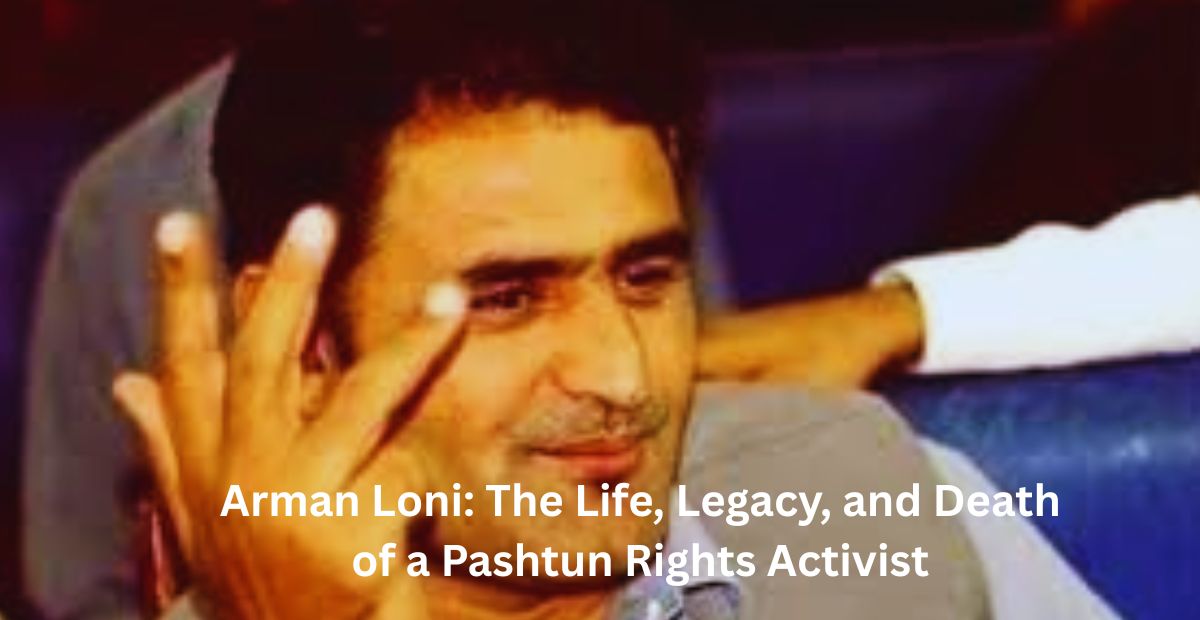Keywords: Arman Loni, Pashtun Tahafuz Movement, PTM, Pashtun rights, Pakistan, human rights, Wranga Loni, Loralai sit-in, Pashto poet, Arman Loni death
Introduction
Mohammad Ibrahim Arman Loni (Pashto: محمد ابراهیم ارمان لوڼی), widely known as Arman Loni, was a respected Pashto literature lecturer, poet, and a central figure in the Pashtun Tahafuz Movement (PTM)—a grassroots campaign advocating for the rights of Pakistan’s marginalized Pashtun community. His untimely death on February 2, 2019, during a peaceful protest in Loralai, Balochistan, became a symbol of resistance and repression in modern-day Pakistan.
Early Life and Education
Born in Sanjawi, Ziarat District of Balochistan, Arman came from a modest Loni Durrani Pashtun family. Despite economic struggles, he worked part-time jobs—from waiter to coal mine clerk—to support his family while pursuing his education. He completed his master’s in Pashto literature from the University of Balochistan and later earned an MPhil with a thesis on metaphorical resistance in Pashto folklore, reflecting his anti-colonial and human rights-driven ideology.
Career and Literary Contribution
Arman Loni passed the Balochistan Public Service Commission exam in 2012 and became a lecturer at Degree College Quetta, later transferring to Degree College Killa Saifullah. He was the founder of Pashtun Progressive Writers, a literary circle that mentored emerging Pashto authors and poets.
His work was not limited to academics—Arman saw poetry as a form of protest. His words echoed the pains and hopes of a marginalized community fighting for justice, peace, and dignity.
Political Activism and the PTM
Arman was politically active from a young age, initially engaging with the Pashtunkhwa Milli Awami Party (PMAP) and its student wing. His activism intensified in 2018, when he and his sister Wranga Loni joined the newly-formed Pashtun Tahafuz Movement (PTM).
Together, they organized and participated in public gatherings, protests, and awareness campaigns across Pakistan. Arman often stayed behind the scenes, while Wranga took the stage. Despite facing threats from tribal elders and state forces, the Loni siblings remained undeterred in their peaceful advocacy.
Events Leading to His Death
In January 2019, after the Loralai suicide attack by the Pakistani Taliban killed nine people, PTM organized a four-day sit-in outside the Loralai Press Club. Arman, along with Wranga, was among the key organizers.
On February 2, 2019, just as the protest was concluding, Arman was allegedly attacked by Assistant Superintendent of Police (ASP) Attaur Rehman Tareen. Eyewitnesses claimed he was struck on the head with a rifle butt. He collapsed and died later at the hospital.
The police claimed he died of a heart attack, but his family and human rights groups contested this narrative. A postmortem revealed blood clots in his brain, likely caused by head trauma.
Aftermath and Protests
Arman’s death sparked nationwide protests. A ‘shutter down’ strike was observed across Balochistan. The government banned key PTM leaders—Manzoor Pashteen, Mohsin Dawar, and Ali Wazir—from attending his funeral, though they defied the ban. On their return, their convoy was fired upon by security forces, further escalating tensions.
Over 20 PTM activists, including Gulalai Ismail, were arrested during the protests. International human rights organizations like Amnesty International and Human Rights Watch demanded their immediate release and called for a transparent investigation into Arman’s death.
Even Afghan President Ashraf Ghani condemned the killing, sparking a diplomatic spat with Pakistan, which labeled his remarks as interference in internal affairs.
Investigations and Official Response
The Senate’s Human Rights Committee eventually ordered the police to lodge a First Information Report (FIR) and conduct a formal inquiry into the incident. Despite these orders, the FIR was never properly pursued, reflecting a broader pattern of impunity when it comes to alleged state violence against Pashtun activists.
The Balochistan Chief Minister, Jam Kamal Khan, requested a detailed report, and senators like Farhatullah Babar and Muhammad Ali Saif later acknowledged inconsistencies in the initial postmortem findings.
Legacy and Impact
Arman Loni’s death marked a turning point for the Pashtun rights movement in Pakistan. He is remembered as PTM’s first martyr, a teacher turned revolutionary who stood against oppression with words, not weapons.
His funeral was attended in person and symbolically in dozens of cities across Pakistan and Afghanistan—from Kabul and Peshawar to Karachi and Herat. His story continues to inspire Pashtuns and other marginalized groups seeking justice and dignity through non-violent resistance.
Conclusion
The life and death of Arman Loni shine a light on the struggles of the Pashtun people, the importance of civil rights, and the cost of peaceful resistance in a militarized state. His journey from a coal mine worker to a professor and poet-activist is both tragic and heroic.
As calls for justice remain unanswered, Arman’s legacy lives on—through his writings, through Wranga’s activism, and through the collective voice of a movement that refuses to be silenced.
Related Tags:
- #ArmanLoni
- #PTM
- #PashtunRights
- #HumanRightsPakistan
- #WrangaLoni
- #PashtoPoet
- #LoralaiSitIn
- #BalochistanActivists
